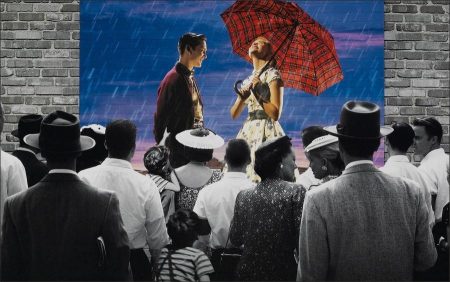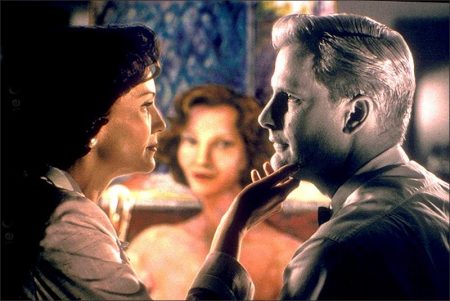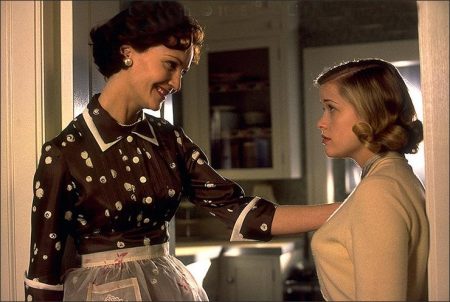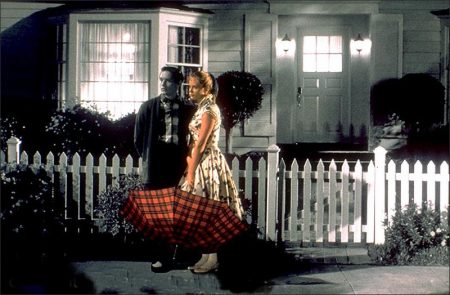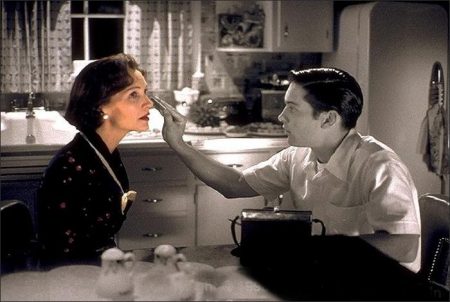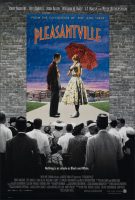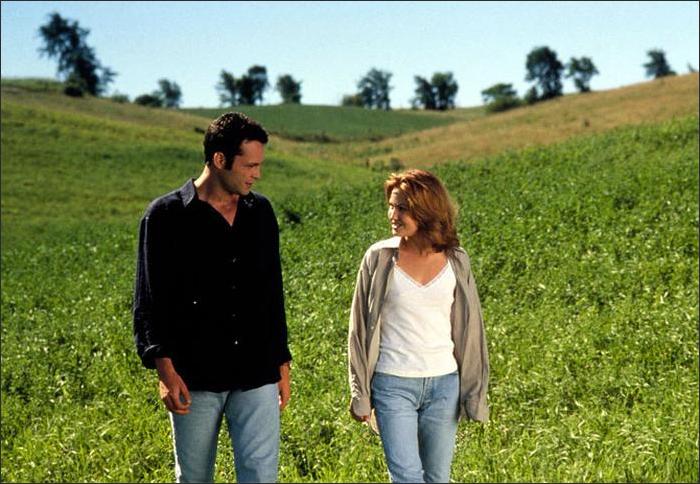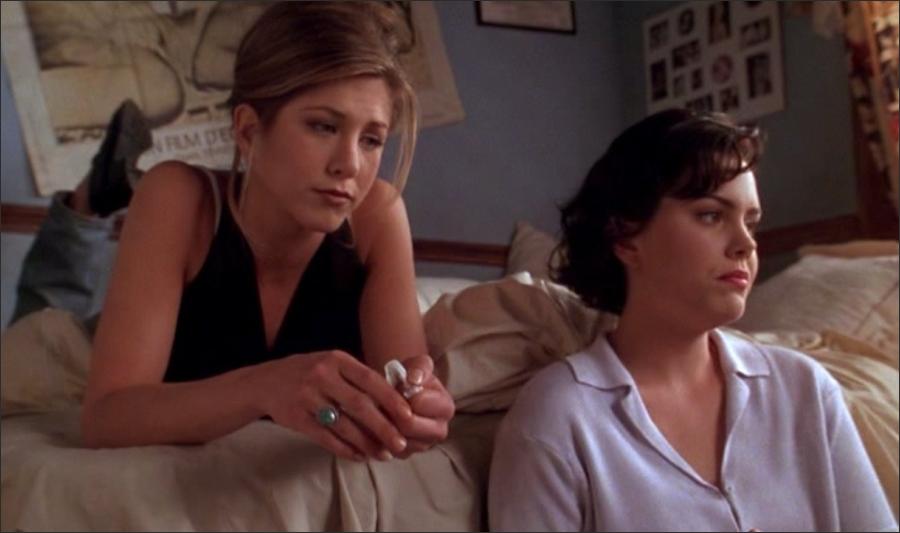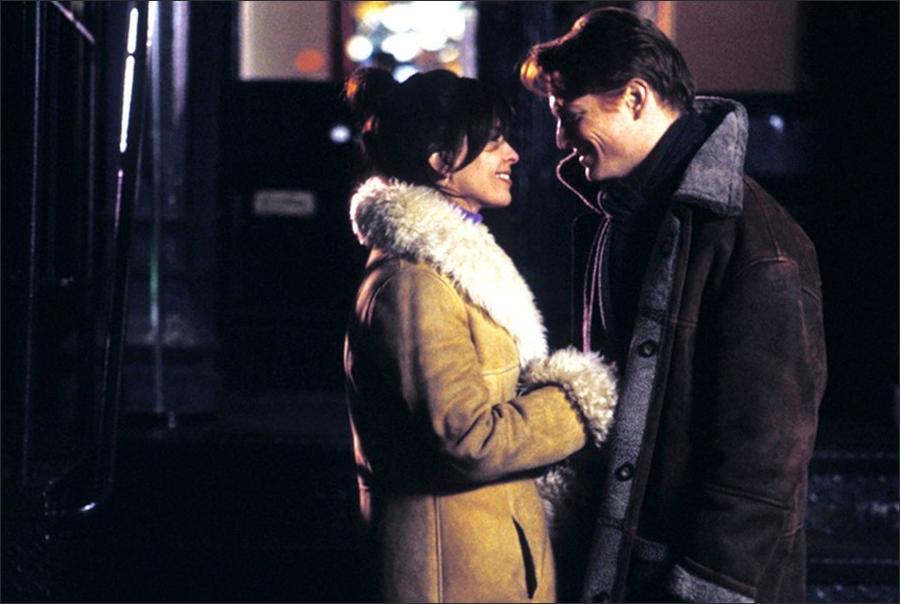Taglines: Pleasantville – It’s Just Around the Corner.
Pleasantville movie storyline. David Wagner is a kid whose mind is stuck in the 1950s. He’s addicted to a classic 50’s sitcom television show called “Pleasantville”. Pleasntville is a simple place, a place where all of its citizens are swell and simple-minded folks, a place where the word “violence”, and life outside of Pleasantville, is unbeknown to its inhabitants; things are perfect down in Pleasantville.
One evening, the life of David and his obnoxious sister Jennifer take a bizarre turn when an eccentric repairman hand them a supposed magical remote. After a quarrel between the siblings, they inexplicably zap themselves into the world of “Pleasantville”. Now, David and Jennifer must adjust to a 50s lifestyle of repressed desires and considerably different societal values while trying to find their way home.
Pleasantville is a 1998 fantasy comedy-drama film written, co-produced, and directed by Gary Ross. It stars Tobey Maguire, Jeff Daniels, Joan Allen, William H. Macy, J. T. Walsh, and Reese Witherspoon, with Don Knotts, Paul Walker, and Jane Kaczmarek in supporting roles. The story centers on two siblings who wind up trapped in a 1950s TV show, set in a small Midwest town, where residents are seemingly perfect. In their attempts to fit in, the two become more aware of social issues such as racism and freedom of speech.
The film was released in the United States by New Line Cinema on October 23, 1998. It was a box office bomb, only acquiring about $49.8 million of a $60 million budget, but received positive reviews for its visuals, acting, and thematic elements and has gained a cult following.
This was the first time the majority of a new feature film was scanned, processed, and recorded digitally. The black-and-white meets color world portrayed in the movie was filmed entirely in color and selectively desaturated and contrast adjusted digitally. The work was done in Los Angeles by Cinesite utilizing a Spirit DataCine for scanning at 2K resolution.[1] and a MegaDef Colour Correction System from Pandora International.
Cameraman Brent Hershman’s death, when he fell asleep driving home after a 19-hour workday on the set of the film, resulted in a wrongful death suit, claiming that New Line Cinema, New Line Productions and Juno Pix Inc. were responsible for the death as a result of the lengthy work hours imposed on the set.
The film is dedicated to Hershman, as well as to director Ross’s mother, Gail, and actor J. T. Walsh, who also died before the film’s release. Shortly before and during the film’s release, an online contest was held to visit the real Pleasantville, Iowa. Over 30,000 people entered. The winner, who remained anonymous, declined the trip, and opted to receive the $10,000 cash prize instead.
Film Review for Pleasantville
From that moment 104 years ago when the Lumiere Brothers’ first paying customers ducked to avoid being run over by the train entering the station at Le Ciotat, moviegoers have had a wary, if progressively sophisticated, relationship with the image on the screen. In 1924, in Sherlock Jr, a dreaming Buster Keaton walked into the film being projected before him; more recently, in Spielberg’s Poltergeist, evil forces emerged from the TV screen to haunt a suburban family, and a benign figure from a Thirties high-society film stepped from the big screen to comfort a depressed housewife in Woody Allen’s Purple Rose of Cairo.
Recently, we’ve had Peter Weir’s The Truman Show, about a man discovering he’s spent his life at the centre of a TV soap opera. And now, made at the same time as Weir’s film, there’s the gentler but equally imaginative Pleasantville, in which two teenagers of the late Nineties, David (Tobey Maguire) and his twin sister Jennifer (Reese Witherspoon), suddenly find themselves in a black-and-white Fifties sitcom set in an idealised community of the Eisenhower era that’s playing on a nostalgia channel. It offers ‘a flashback to happier times’, an escape from Aids, unemployment and an increasingly polluted environment that earnest schoolteachers tell them lies in store.
A fan of the show, the lonely David is preparing to enter a trivia quiz about Pleasantville, while the popular Jennifer, to whom ‘sluttish’ is a term of praise, is planning to spend the evening watching MTV while making out with her boyfriend. They break the remote control while fighting over which channel to watch, and a gnome-like fairy godfather turns up in the form of a TV repair man.
Played by Don Knotts, a comic sidekick from TV sitcoms of the Fifties, he gives them a new switcher that transports them to this monochrome Eden where they become the children of the perfect small-town parents, George (William H. Macy) and Betty (Joan Allen). In this middle-American Never-Never Land, everyone likes everyone else, it doesn’t rain, there’s no sex or lavatory bowls, the books in the library are blank, every basketball shot goes through the hoop, firemen exist to rescue cats and the only problems are happy ones.
Pleasantville is an Oz in black and white, a Utopia like Shangri-La and those exemplary societies encountered in Star Trek, and the kids’ first instinct is to get back to the future where they belong. But gradually, the pair start altering this society – wilfully in Jennifer’s case, morally in David’s. They quite literally introduce colour into the lives of their new fellow citizens, whose tongues and lips turn red, then their whole faces, as they discover the life of the body and the mind, how to choose and how to change.
Technically, it’s both brilliant and witty and much of it is curiously moving. For instance, Jennifer explains to her innocent ‘mother’ the joys of sex, and as she lies in a hot tub discreetly masturbating for the first time, the whole bathroom turns into glowing Technicolor.
Meanwhile, David encourages the owner of the local diner (Jeff Daniels, the pith-helmeted hero who steps off the screen in Purple Rose of Cairo) to take up painting by giving him an art book that begins significantly with a renaissance picture of Adam and Eve leaving Eden and comes up to Cezanne and Kandinsky.
It is the town’s men, led by the unswerving Mayor (the late J.T. Walsh), who remain resolutely monochrome. After a Hitlerian orgy of book-burning, the destruction of decadent art and notices saying ‘No Coloureds’ have appeared in shop windows, they draw up a code of conduct to restrict change and keep everyone and everything in its place. At this point, the film becomes a deadly serious fable about the current conflict between the free-thinking liberal heirs of the Sixties and the right-wing adherents of family values and religious fundamentalism who wish to restore an innocent prelapsarian America that never really existed.
There is some narrative strain towards the end, but mostly this thoughtful, generous movie is a triumph for writer-director Gary Ross, his first-rate cast and his gifted team of designers and special-effects experts.
Pleasantville (1998)
Directed by: Gary Ross
Starring: Tobey Maguire, Jeff Daniels, Joan Allen, William H. Macy, Jane Kaczmarek, J. T. Walsh, Don Knotts, Reese Witherspoon, Marissa Ribisi, Denise Dowse
Screenplay by: Gary Ross
Production Design by: Jeannine Oppewall
Cinematography by: John Lindley
Film Editing by: William Goldenberg
Costume Design by: Judianna Makovsky
Set Decoration by: Jay Hart, Mickey S. Michaels
Art Direction by: William Arnold, Dianne Wager
Music by: Randy Newman
MPAA Rating: PG-13 for some thematic elements emphasizing sexuality, and for language.
Distributed by: New Line Cinema
Release Date: October 23, 1998
Views: 233
